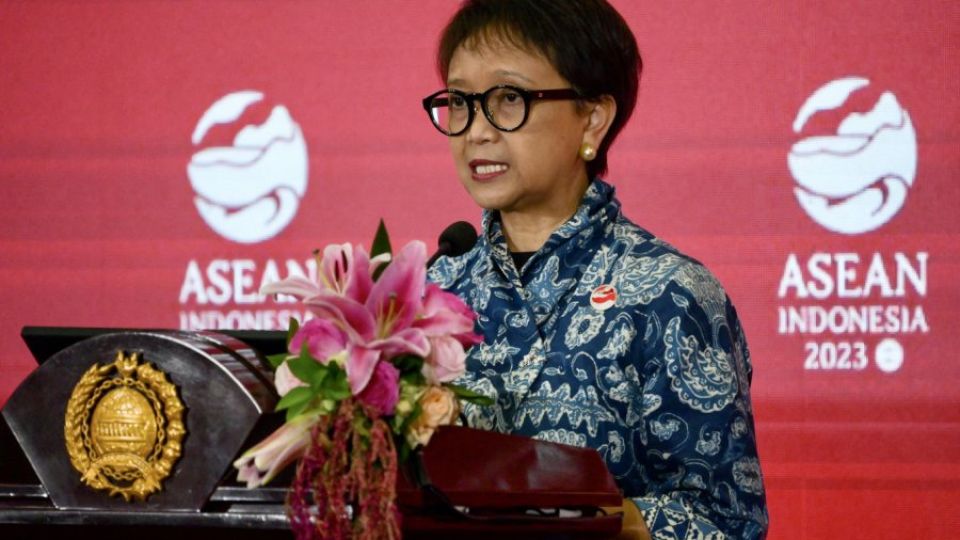February 7, 2023
JAKARTA – The ASEAN Foreign Ministers’ Retreat wrapped up in Jakarta on Saturday, with a proposal from Indonesia to implement a five-point peace plan for Myanmar and to resume negotiations for the Code of Conduct (COC) in the South China Sea.
Foreign Minister Retno Marsudi said that Jakarta proposed an “implementation plan” to ASEAN members for the “five-point consensus” agreed with the junta in April 2021 that called for an end to violence and dialogue between all parties in Myanmar.
“This plan is very important for ASEAN, in particular the chair, as guidance to address the situation in Myanmar in a united manner. It shows a strong unity of ASEAN members to implement the five-point consensus,” Retno told a press briefing on the last day of the talks.
“Broad support was received from all member states to this plan.”
The minister did not elaborate on what the implementation plan would entail. The minister’s expert staff member for regional diplomacy Ngurah Swajaya, meanwhile, said that the five-point consensus would remain the main guide for ASEAN to address the issue of Myanmar, including for the implementation plan discussed during the two-day retreat.
“Our point [with the implementation plan] is that we can reach concrete results for all points in the five-point consensus,” Ngurah said.
Retno said that the ASEAN foreign ministers also discussed regional and international issues, including the COC, whereby ASEAN member states were committed to concluding negotiations of the code “as soon as possible”.
Negotiations on the COC, a proposed framework to help tackle territorial and maritime disputes in the strategic waterway, have stalled for years as some member states prioritized bilateral ties with China over a regional consensus.
Indonesia is preparing to host a round of negotiations on the COC this year, the first taking place in March, according to the Foreign Ministry, where Indonesia as ASEAN chair will lead efforts to “explore new approaches” in navigating the increasingly “destabilized” region.
“What’s important [about the negotiation] is that all of us have agreed that [the COC] has to be effective, implementable [and] in accordance with international law,” the ministry’s ASEAN cooperation director general Sidharto Suryodipuro said on the sidelines of the event at the ASEAN Secretariat.
However, ASEAN likely will not touch on the issue of maritime territorial claims for the purposes of the COC negotiations. “That’s because the discussion of [territorial] ownership should be through bilateral negotiations,” Sidharto said.
Permanent envoy
Experts have expressed hope that Indonesia, as ASEAN chair, could push significantly on the issue of Myanmar and the COC negotiations.
“[In terms of the Myanmar issue] Indonesia can learn from its own handling of the Cambodian crisis in which Indonesia used multiple channels and approaches in helping to settle the conflicts,” Gadjah Mada University (UGM) international relations researcher Randy Nandyatama said on Saturday. He was referring to the role of Indonesia in brokering peace in Cambodia in the 1980s and early 1990s.
Dewi Fortuna Anwar, a senior researcher on international relations at the National Research and Innovation Agency (BRIN), said that the implementation of the peace plan would likely require a permanent ASEAN special envoy on Myanmar.
The fact that the special envoy role will change hands each year in tandem with the bloc’s rotating chairmanship means that each envoy will likely use different approaches on the junta, she said.
“So, if we want a serious implementation of the five-point consensus, we need to have a review into the special envoy. Only after that could other points [in the consensus] such as engagement with all stakeholders or facilitating dialogues be addressed.”
Being nonclaimant makes good host
Responding to Indonesia offering to host the COC negotiations, Dewi pointed out that Indonesia could be a good host as it had no territorial claim in the South China Sea.
She said that during the negotiations, Indonesia needed to make sure that ASEAN was not being dictated by China and that the United Nations Convention on the Law of the Sea (UNCLOS) was consistently applied. “Indonesia has the experience and good track record in promoting UNCLOS, which hopefully could be used to accelerate the negotiations,” she said.
UGM’s Randy said that as the biggest country in Southeast Asia, Indonesia could project itself as a competent and credible party to persuade China to the negotiating table.


